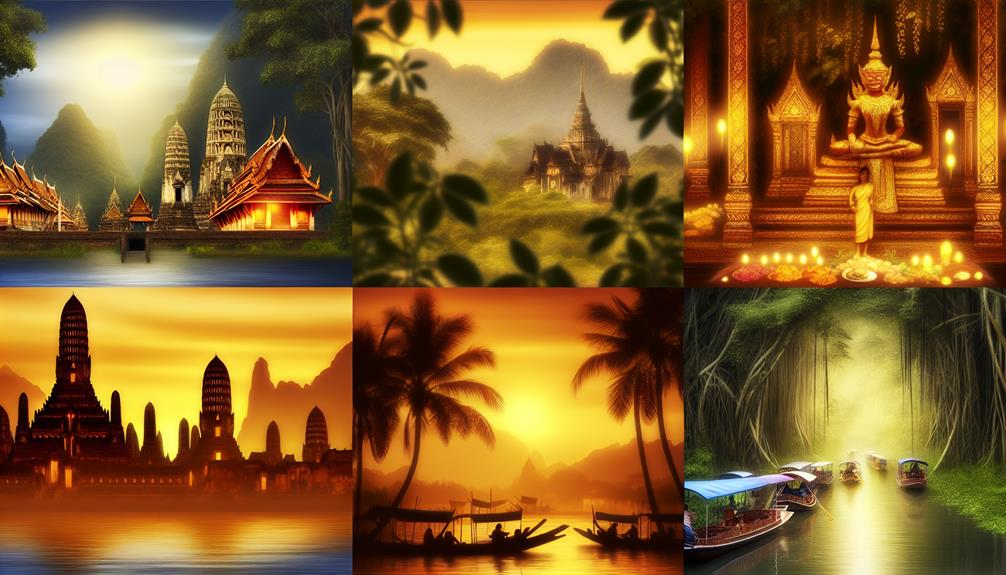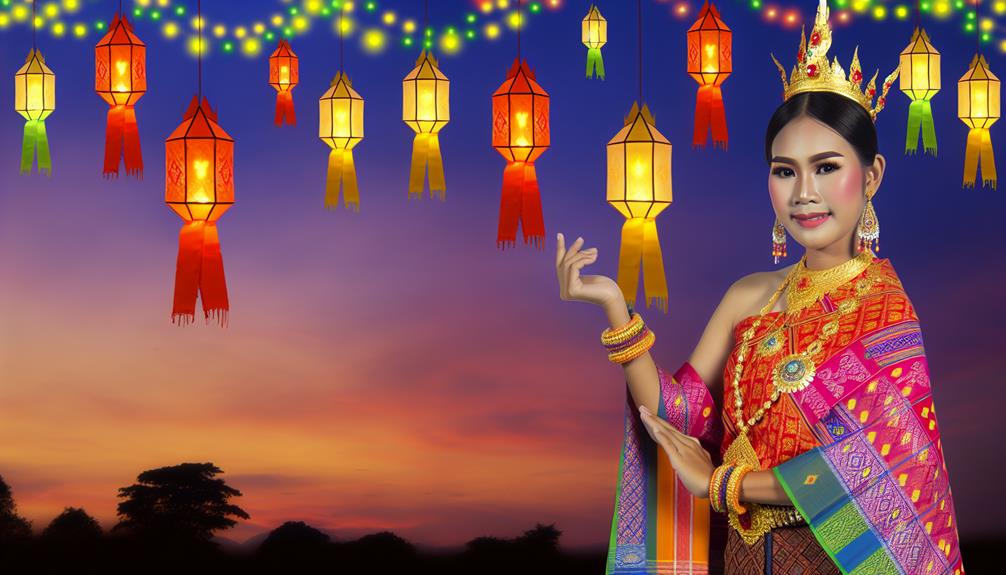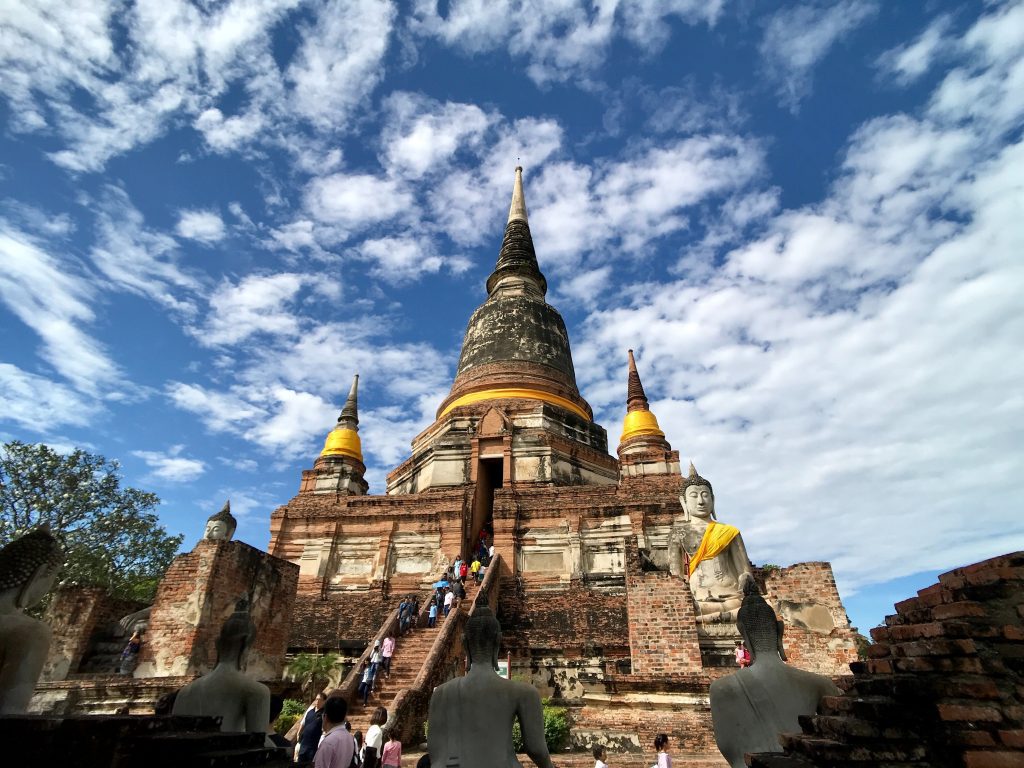As you navigate through the Thailand’s history, it’s as if you’re peeling back the layers of a richly woven silk, each thread revealing a new facet of the country’s intricate past.
Consider Phanom Rung, a majestic temple complex perched atop an extinct volcano, which might not headline every travel brochure but stands as a testament to the grandeur of the Khmer Empire. Or Ayutthaya, once a flourishing Siamese trade center and now a haunting tableau of ruins whispering stories of splendor and devastation.
As you trace the remnants of Lampang’s buried kingdom and puzzle over the enigma of Si Satchanalai, you’re drawn deeper into a world where ancient echoes from Ban Chiang still resonate. These sites are mere whispers of a hidden narrative, inviting you to uncover the depths of Thailand’s lesser-known historical landscapes.
What secrets do these relics hold, and how do they shape the understanding of a nation’s soul? This discussion beckons you to unravel a tapestry not often showcased, promising revelations of an enigmatic past that has shaped the vibrant, cultural mosaic of Thailand today.
The Mystical Phanom Rung
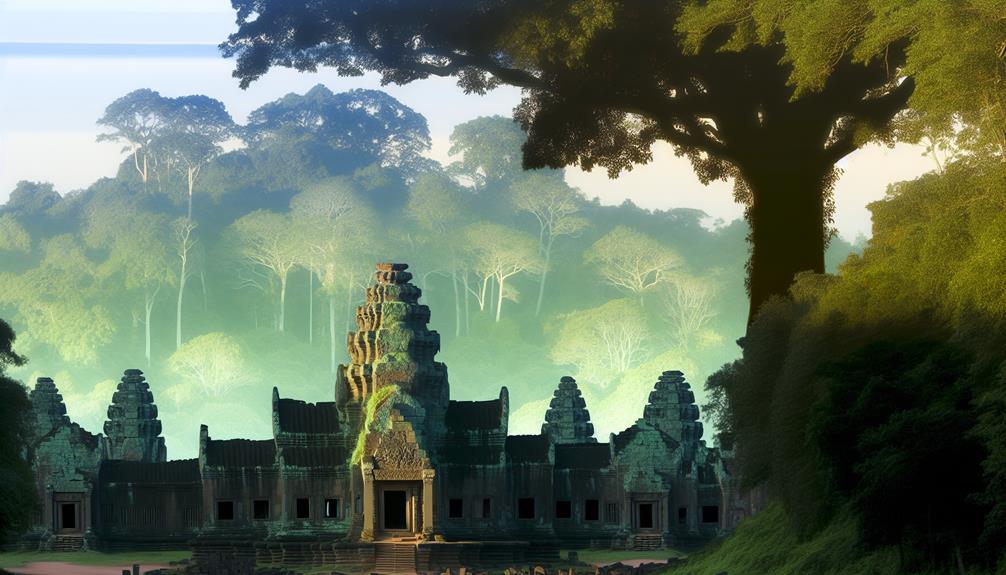
Perched atop an extinct volcano, Phanom Rung is a breathtaking Hindu sanctuary that beckons you into Thailand’s ancient past. This architectural marvel, constructed between the 10th and 13th centuries, stands as a testament to the grandeur of the Khmer Empire. As you wander through its corridors, you’re tracing the steps of ancient pilgrims, drawn to the site’s sacredness.
You’ll marvel at the intricate carvings and the precise alignment with the sun, which, during the annual solar phenomenon, bathes the central sanctuary in a golden light. This isn’t just a pile of old stones; it’s a place where history breathes, inviting you to unravel its mysteries.
Don’t overlook the surrounding landscape as it offers a serene backdrop, enhancing the mystical vibe of Phanom Rung. It’s more than just a historical site; it’s a journey into a bygone era, a chance to connect with a civilization that once flourished here. So take a moment, feel the ancient energy surrounding you, and let Phanom Rung’s whispers of the past leave you spellbound.
Tracing Ayutthaya’s Heritage
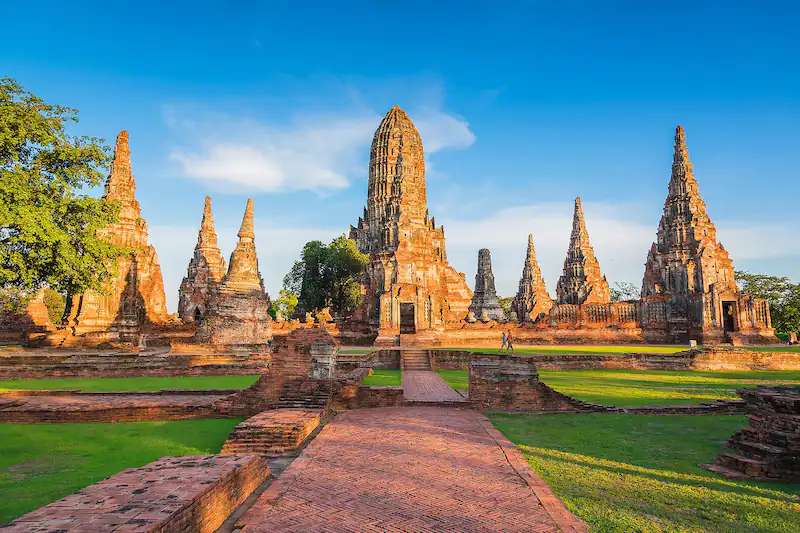
Delve into the heart of Thailand’s rich history as you explore Ayutthaya, the once-magnificent capital whose ruins now whisper tales of its former glory. Founded in 1350, Ayutthaya was the second Siamese capital after Sukhothai. It thrived for over 400 years before falling to the Burmese in 1767, leaving behind a landscape scattered with remnants of its heyday.
As you wander through the historical park, you’ll come across towering prangs (reliquary towers) and gigantic monasteries that paint a picture of Ayutthaya’s splendor. Don’t miss Wat Phra Si Sanphet, with its iconic row of chedis that once housed the ashes of Ayutthayan kings. Here, you’re tracing the same steps that ancient monarchs and their subjects walked centuries ago.
Venture further, and you’ll find Wat Mahathat, where the famous stone Buddha head entwined in the roots of a banyan tree offers a profound juxtaposition of nature and spirituality. It’s a reminder that although empires fall, their legacy can endure in the most unexpected ways.
Remember to respect the site by following the preservation guidelines—Ayutthaya isn’t just a relic to admire, but a piece of living history that you’re now a part of. Witnessing these ruins first-hand, you’re connecting with a past that continues to shape Thailand’s cultural identity.
Lampang’s Buried Kingdom
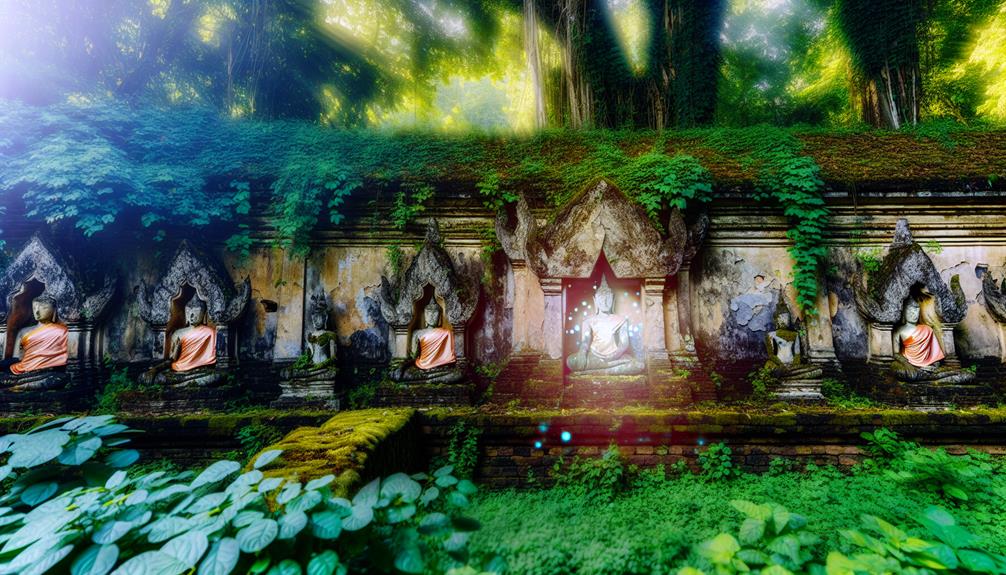
As you leave behind the ancient spires of Ayutthaya, prepare to uncover the lesser-known treasures of Lampang, where a kingdom once thrived in the shadows of history. Tucked away in the northern reaches of Thailand, Lampang holds secrets that you’ll be eager to explore.
This region was once the heart of the Hariphunchai Kingdom, predating the Lanna dynasty that has lent Northern Thailand much of its cultural heritage. You’ll find remnants of this buried kingdom at sites like Wat Phra That Lampang Luang, a stunning Lanna-style Buddhist temple. It’s not just a place of worship; it’s a portal to the past. Here, the chedis and murals tell stories of a time long gone, and you’ll feel the historical weight the moment you step onto the temple grounds.
Don’t miss the Dhanabadee Ceramic Museum, where you’ll discover Lampang’s legacy as a center of ceramic production. The traditional techniques you’ll witness are a living testimony to the kingdom’s ingenuity. Engage with local historians and artisans who keep the spirit of Lampang’s buried kingdom alive through their crafts and narratives.
In Lampang, history isn’t just preserved; it’s a part of daily life. So take your time, delve deep, and let the whispers of the past guide you through this hidden gem.
The Enigma of Si Satchanalai
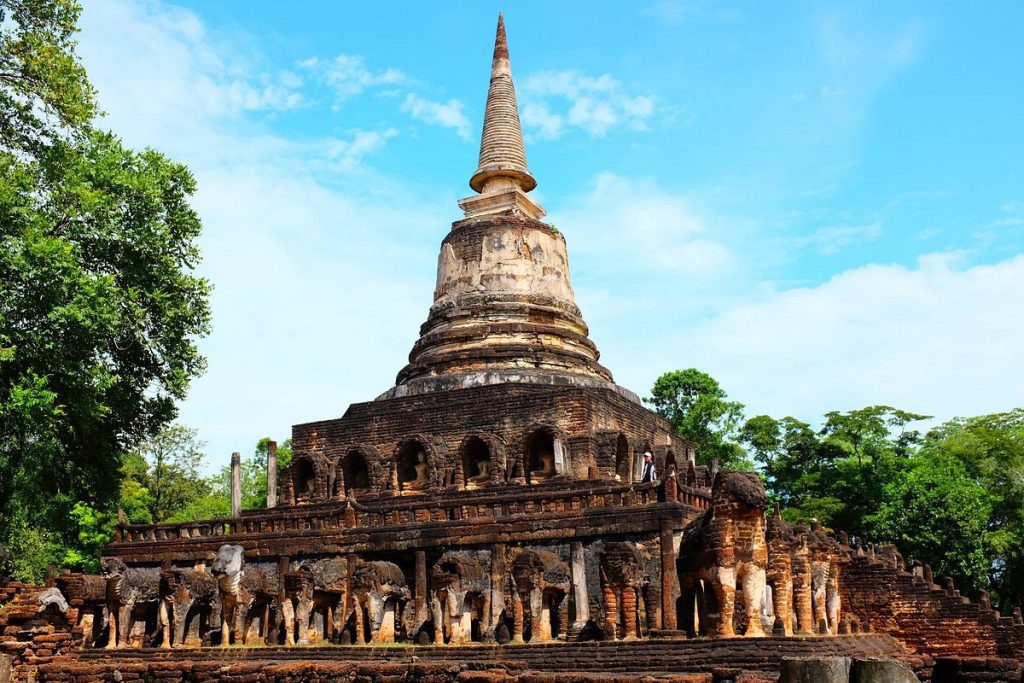
Venture northward from Lampang and you’ll stumble upon the enigmatic ruins of Si Satchanalai, an ancient city whose stories are etched into the very bricks and pathways of its temples. This historic sibling to the more famous Sukhothai, Si Satchanalai rests on the banks of the Yom River, once a pivotal community in the Kingdom of Sukhothai during the 13th to 15th centuries.
As you wander through the remains, you’ll find yourself in the midst of towering stupas and intricate carvings that have withstood the test of time. The heart of the site is Wat Phra Si Rattana Mahathat, known for its imposing Buddha images and a central lotus-bud chedi, a remarkable example of classic Sukhothai-style architecture.
Don’t miss the Celadon Kiln Site Study and Conservation Centre, where you’ll dive into the history of Si Satchanalai’s renowned ceramic production, once a major industry here. The ancient kilns, excavated and preserved, offer a unique glimpse into the ingenuity of the Sukhothai potters.
Si Satchanalai’s allure lies not just in its historical significance but also in its tranquil ambiance. Far less crowded than other historical parks, it’s a place where you can truly absorb the echoes of the past, uninterrupted. So take your time to explore and let the mysteries of this once-great city reveal themselves to you.
Ban Chiang’s Ancient Echoes

Step back in time with a visit to Ban Chiang, where the echoes of an ancient civilization resound through its red pottery and burial sites. Nestled in Thailand’s northeastern province of Udon Thani, this archaeological wonder unveils a history stretching back to the Bronze Age.
You’ll be mesmerized by the sophisticated craftsmanship of the ceramics, revealing a culture that valued both function and form.
As you wander through the site, you’ll notice the intricate burial practices etched into the soil, telling tales of social structures and rituals steeped in spirituality. Ban Chiang’s discoveries turned heads worldwide, showcasing a society that thrived over 5,000 years ago.
Don’t miss the Ban Chiang National Museum, where you’ll get an up-close look at the ancient artifacts. It’s a treasure trove of knowledge, with displays that illuminate the daily lives of these early inhabitants. From tools to ornaments, each piece holds a story, a glimpse into their timeless legacy.
This UNESCO World Heritage site isn’t just a collection of relics; it’s a bridge to a past that shaped the present-day cultural landscape of Thailand. Let Ban Chiang’s ancient echoes guide you through an unforgettable chapter of human civilization.
Frequently Asked Questions
How Can Travelers Show Respect and Observe Cultural Etiquette When Visiting Thailand’s Historical Sites?
When visiting historical sites, you should dress modestly, remove your shoes when required, and avoid touching sacred objects. Always speak quietly and show reverence to maintain respect for local customs and traditions.
What Are the Lesser-Known Myths or Legends Surrounding Thailand’s Ancient Landmarks That Locals Still Talk About Today?
You’ll find Thailand’s ancient landmarks steeped in myths, like the whispers of spirits at Ayutthaya, or the legendary guardians said to roam the ruins of Sukhothai. Locals still recount these tales today.
Are There Any Restrictions or Permits Required for Foreign Tourists to Visit Archaeological Sites in Thailand?
You don’t need special permits to visit most archaeological sites in Thailand, but some areas may have restrictions to protect heritage. Always check local guidelines before you go to ensure compliance.
How Has the Thai Government Worked to Preserve These Historical Sites in the Face of Modern Development and Tourism?
You’ve seen the Thai government balance preservation with progress by enforcing strict conservation laws and partnering with UNESCO to protect historical sites amidst the pressures of modern development and tourism.
Can Visitors Participate in Any Traditional Activities or Ceremonies That Are Connected to Thailand’s Secret Historical Gems?
You can indeed participate in traditional activities and ceremonies, which offer a deeper understanding and appreciation of the local culture and history during your visit.
Conclusion
You’ve just journeyed through Thailand’s hidden historical treasures, from the mystic heights of Phanom Rung to the echoes of ancient Ban Chiang.
Each site whispers tales of bygone eras, inviting you to dig deeper into the country’s rich past.
As you leave these lesser-known ruins, carry with you the profound sense of connection to the civilizations that once thrived here.
Thailand’s secrets aren’t just relics; they’re timeless bridges to a storied heritage.

